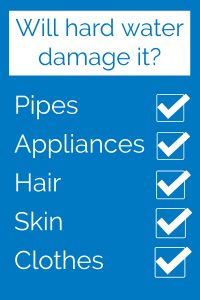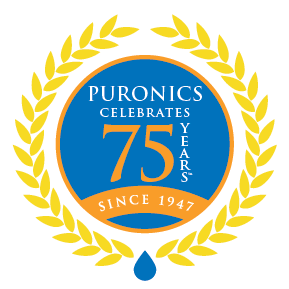Last Updated on April 12, 2021
Hard water, or water hardness, is a term you might be familiar with. Usually, it’s associated with problems with plumbing, appliances, cleaning and even skincare. We’re here to break down what hard water is, when it’s a problem and what you can do about it.
What is Hard Water?
Hard water is water that contains a significant amount of dissolved minerals, mostly calcium and magnesium. The presence of these minerals prevents soap and detergent from lathering, instead creating an insoluble curdy substance in the water. This is the original reason it was called hard water – not because minerals and scale deposits are “hard”, but because the water made it “hard” to wash anything.
Water hardness is usually expressed in grains per gallon (gpg) or parts per million (ppm) as calcium carbonate equivalent. The Water Quality Association (WQA) and the American Society of Agricultural Engineers (S-339) define their water hardness scale as follows:
| Term | Grains per Gallon (gpg) | Parts per million (ppm or mg/L) |
| Soft | <1.0 | <17.0 |
| Slightly Hard | 1.0-3.5 | 17.1-60 |
| Moderately Hard | 3.5-7.0 | 60-120 |
| Hard | 7.0-10.5 | 120-180 |
| Very Hard | >10.5 | >180 |
Source: WQA
Where is Hard Water Found?
When water falls from the sky as rain, sleet or snow, it does not contain calcium and magnesium and is considered soft. It picks up these minerals, as well as other contaminants, as it passes over or through the earth. Common calcium minerals include chalk, limestone and marble, which are all composed of calcium carbonate (CaCO3) in differing structures. These mineral deposits can be dissolved into the groundwater as ions, and later create scale deposits on your kitchen sink. Hard water is found in areas where these calcium-based or bicarbonate minerals are abundant. It is estimated that 85% of the United States has hard water.
Is Hard Water Bad for You?
 Hard water poses no health risks, so it is not regulated by the EPA. However, it can wreak havoc on plumbing, household items – even your skin and hair.
Hard water poses no health risks, so it is not regulated by the EPA. However, it can wreak havoc on plumbing, household items – even your skin and hair.
When hard water is heated, it creates a layer of calcium carbonate that causes scale deposits to build up on pipes, appliances and fixtures. This scale buildup is difficult to clean and can cause extra energy to be used. For example, a water heater that is running on hard water must first heat up the layers of scale before it can heat the water. This puts a strain on the system which can cause it to die before its time. A 2009 study commissioned by the Water Quality Research Foundation and conducted by the Battelle Memorial Institute found that running hard water through water heaters cut efficiency by up to 48%.
Hard water leaves spots on windows, dishes, cars, glasses, shower doors, toilets, tubs, tiles and fixtures. It causes soap to form a curd which is difficult to rinse. You might have noticed a white residue on your bathroom fixtures and shower door. The curd sticks to your skin, clothes and shower doors resulting in soap scum. Since there’s still a layer of soap left behind, your skin can be dry and itchy, exacerbating skin conditions like eczema and acne. Your hair can appear dull and lifeless because the soap stays behind. Washing clothes in hard water causes the soap curd to get stuck in between the fibers, making them stiff and discolored.
The hardness of water in your home can cause everything from early appliance failure to stiff laundry to dry and itchy skin. It’s worth testing the water hardness in your home if you have any of the problems described above, or even have just seen the scale deposits on your fixtures.
How is Hard Water Treated?
The most effective way to treat hard water is to soften it by removing the calcium and magnesium. This can be done using a salt-based ion exchange resin.
Ion exchange is a process through which ions of the same charge (in this case, cations) are exchanged between an insoluble solid and a solution in contact with it. In the case of water softening, calcium and magnesium ions present in the water coming into the home are exchanged for sodium or potassium ions that are attached to resin beads. Sodium and potassium do not cause the problems that calcium and magnesium do.
As the water passes through it, the resin becomes saturated with calcium and magnesium. Luckily, the ion exchange process is reversible, meaning the resin can be regenerated and used over and over. To do this, a brine solution is washed through the tank, replacing the calcium and magnesium ions with sodium or potassium. Then, the resin is ready to continue softening the water, protecting your home from scale deposits and other effects of water hardness. Regeneration is typically set to happen when water is not being consumed, like in the middle of the night.
Are You Experiencing Hard Water Problems?
Dealing with hard water can be frustrating, time-consuming and expensive, but you don’t have to live with it. Take a look at our residential water treatment options or read about how Puronics water softeners work. Then, contact us for a free water treatment consultation. We’re happy to help you solve your water problems.
© Copyright 2021 Puronics, Inc. All rights reserved.

 Puronics, Incorporated
Puronics, Incorporated




[…] Hard water is water that contains a significant amount of calcium and magnesium, minerals that it picks up as it travels through the earth. These minerals cause scale to build up inside of pipes and water-using appliances and also on fixtures, reducing water flow and causing damage. When combined with soap, hard water forms a curd instead of a lather, which is difficult to rinse off, causing dry skin and dull hair. The soap curd can also get stuck in between fibers, making laundry washed in hard water look yellowish. These minerals cause water spots on glass, silverware and other surfaces that come into contact with the hard water. […]